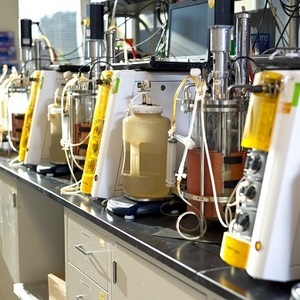ExxonMobil, REG report progress in cellulosic biodiesel research

Photo: Renewable Energy Group Inc.
November 1, 2017
BY ExxonMobil
ExxonMobil and Renewable Energy Group Inc. announced Nov. 1 that by utilizing REG’s patented fermentation technology, the companies’ joint research program has demonstrated the ability to convert sugars from a variety of nonedible biomass sources into biodiesel.
“Our first challenge during the initial research was to determine technical feasibility and potential environmental benefits,” said Vijay Swarup, vice president of research and development at ExxonMobil Research and Engineering Co. “We’re optimistic as the results indicate good potential for advancing the technology, and we look forward to continuing our work with REG Life Sciences.”
During their initial research, the companies successfully validated the feasibility of the REG Life Sciences fermentation technology across multiple cellulosic sugar compositions produced with a variety of methods from various nonedible biomass sources. The research also confirmed REG Life Sciences’ technology is capable of achieving substantial reductions of full-lifecycle greenhouse gas emissions compared to traditional diesel fuel.
Advertisement
Advertisement
ExxonMobil signed an agreement with REG in January 2016 to study the production of biodiesel through fermentation of renewable cellulosic sugars from sources such as agricultural waste. The companies have agreed to extend the research program based on their positive findings and are excited to continue to jointly explore the technology’s potential for scalability.
“Biofuels today are made largely from food sources, such as corn and sugar cane,” said Swarup. “ExxonMobil is challenging that paradigm by exploring a portfolio of large-scale biofuels solutions that do not compete with food and water. Our work with REG Life Sciences has been critical to better understanding the potential for converting cellulosic feedstock from agricultural waste into a commercially viable diesel fuel, as well as the lifecycle greenhouse gas implications of that process.”
REG Life Sciences has developed proprietary technology that relies on microbes to convert cellulosic sugars into biodiesel in a one-step fermentation process. Cellulosic feedstocks derived from agricultural waste contain multiple types of sugars, including glucose and xylose, as well as impurities that can inhibit the fermentation process.
“ExxonMobil has been a great partner and we are proud of what we have accomplished to date,” said Eric Bowen, vice president of REG Life Sciences. “The Life Sciences team, led by Fernando Sanchez-Riera, senior director of fermentation process development, made key discoveries in advancing the commercialization of fermenting diverse cellulosic sugars into renewable, clean-burning diesel fuel. We are excited to take these discoveries to the next level. We believe our REG Life Sciences technology holds great potential as an innovation platform across multiple industries and can think of no partner better than ExxonMobil to help us realize that potential in fuels.”
Advertisement
Advertisement
A breakthrough in cellulosic biodiesel production could have broad implications for the transportation sector. Global demand for transportation-related energy is projected to increase by about 25 percent through 2040, and accelerating the reduction in emissions from the transportation sector through technologies like biodiesel will play a critical role in reducing global greenhouse gas emissions.
ExxonMobil is also actively researching other emission-reducing technologies, including algae biofuels and carbon capture and sequestration. In June 2017, ExxonMobil and partner Synthetic Genomics Inc. announced a breakthrough in joint research into advanced biofuels involving the modification of an algae strain that more than doubled its oil content without significantly inhibiting the strain’s growth.
In 2016, ExxonMobil announced its partnership with Connecticut-based FuelCell Energy, Inc. to advance the use of carbonate fuel cells to economically capture carbon emissions from natural gas power plants while generating hydrogen and additional electricity. Since 2000, ExxonMobil has spent about $8 billion to develop and deploy lower-emission energy solutions across its operations.
Related Stories
The U.S. EPA on July 8 hosted virtual public hearing to gather input on the agency’s recently released proposed rule to set 2026 and 2027 RFS RVOs. Members of the biofuel industry were among those to offer testimony during the event.
The USDA’s Risk Management Agency is implementing multiple changes to the Camelina pilot insurance program for the 2026 and succeeding crop years. The changes will expand coverage options and provide greater flexibility for producers.
The USDA’s National Agricultural Statistics Service on June 30 released its annual Acreage report, estimating that 83.4 million acres of soybeans have been planted in the U.S. this year, down 4% when compared to 2024.
SAF Magazine and the Commercial Aviation Alternative Fuels Initiative announced the preliminary agenda for the North American SAF Conference and Expo, being held Sept. 22-24 at the Minneapolis Convention Center in Minneapolis, Minnesota.
Scientists at ORNL have developed a first-ever method of detecting ribonucleic acid, or RNA, inside plant cells using a technique that results in a visible fluorescent signal. The technology could help develop hardier bioenergy and food crops.
Upcoming Events










